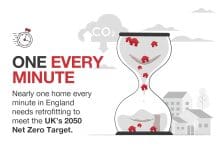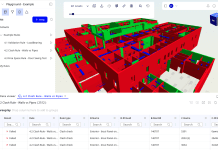Horizon 2020 project BIM-SPEED is making BIM a harmonised “building information speedway” for energy-efficient renovation works. Eugenio Quintieri of the European Builders Confederation and Sue Arundale of the European Construction Industry Federation outline how it will work
It is becoming common knowledge that buildings are responsible for approximately 40% of final energy consumption and 36% of CO2 emissions in the European Union. Residential buildings in particular constitute more than 75% of the total floor area of the existing building stock, which means that boosting building renovation can therefore contribute to a significant reduction of energy consumption across the EU.
At the same time, Building Information Modelling is being increasingly used in renovation projects across Europe, proving viable in innovative pilot projects. As a brief reminder, BIM combines working methods and a 3D digital model to enable the sharing of reliable information throughout the life of a building or infrastructure, from its design until its demolition.
The EU’s energy efficiency targets will not be reached if no major, effective initiatives are taken in the construction industry, especially in the field of digitalisation. With 3m enterprises and 18m workers representing around 9% of EU Gross Domestic Product, such initiatives could have a major impact.
The optimisation of energy efficiency of the houses and buildings we live and work in could be improved by the use of specialised techniques and methods, such as BIM, which can improve the energy performance, not only of the construction sector, but also of European society as a whole.
We, the European Builders Confederation (EBC) – representing exclusively construction SMEs and craftsmen – and the European Construction Industry Federation (FIEC) – representing construction companies of all sizes – are well aware of this. In this framework, joining our efforts with 21 other European organisations of construction stakeholders, we published a European Construction Industry Manifesto for Digitalisation, a call for strong political leadership from the European Union, an appropriate regulatory framework on data policy and a budgetary focus on digital skills, R&D and deployment of IT infrastructure.
To respond to these energy efficiency challenges, we have also decided to participate in the EU-funded Harmonised Building Information Speedway for Energy-Efficient Renovation – BIM-SPEED – project. Financed by the EU Horizon 2020 programme for four years, this project had its formal kick-off meeting on 29-30 November in Brussels.
With the objective of making a decisive contribution to the energy performance of residential buildings, the mission of BIM-SPEED is to take “BIM for renovation” to deep renovation level, in order to achieve at least 60% energy savings, while accelerating the market uptake across the EU at the same time.
BIM-SPEED aims to enable all construction stakeholders to adopt BIM tools and methods by providing an affordable BIM cloud platform, a set of interoperable tools and standardised procedures for as-built data acquisition, modelling, simulation, implementation and maintenance of renovation solutions.
Giving special attention to stakeholders as a key success factor for BIM adoption, BIM-SPEED relies on a trans-disciplinary approach comprising process, ICT and social innovation. Interoperability is a key word for BIM-SPEED partners. We want to develop a full range of BIM tools for renovation that will be hosted on an innovative BIM cloud platform, which will be launched and available free-of-charge for all stakeholders immediately from the beginning of the BIM-SPEED project.
Heating, ventilation and air conditioning (HVAC) are also keywords as BIM-SPEED will engineer seamless integration and quick installation of building and HVAC products for renovation into the existing buildings; indeed, such “plug-and-play” solutions are crucial for the overall time reduction target.
In other words, BIM-SPEED has the ambition to accelerate energy-efficient renovation of residential buildings across the EU through the implementation of state-of-the-art BIM solutions with a real impact on the energy performance of buildings. Through innovative BIM tools and methodologies, this project aims to facilitate deep renovation processes, in a shorter time, with reduced costs, better quality and higher performance.
Considering that most renovation projects of residential buildings are carried out by SMEs in Europe, it is important to equip them with the right skills and tools. In this context, special support for construction SMEs, which make up the overwhelming majority of companies in our industry, is critically necessary. For this reason, BIM-SPEED will present its holistic solutions in 12 real demonstration cases throughout the four-year project duration, with a focus on SME involvement.
To fulfil its mission, under the lead of the Technical University of Berlin, BIM-SPEED will gather universities (Polytechnic University from Marche and Erasmus University Rotterdam), key European umbrella organisations from the construction industry (EBC, FIEC, Architects’ Council of Europe and REHVA), research and technology centres (CSTB, Technology Centre CARTIF, Planen Bauen 4.0), R&D firms (DEMO consultants, Hochtief ViCon, CYPE Soft, Stress, Arcadis Romania, Architectural Spies and LKS Ingeneria), construction companies (UN Studio, FASADA, Mostostal Warszawa and Metabuild) and one public-sector company (Visesa).
To harmonise EU best practice on BIM, this project will also benefit from the partners’ involvement in the BuildingSmart standardisation platform, the EU BIM Task Group and Small Business Standards, the European organisation representing SMEs in the standardisation community.
A collaborative effort for an efficient digital transformation is crucial. That is why EBC will also connect this project to other initiatives in which the organisation is deeply involved, such as the Horizon 2020 project BIM-based tools and technologies towards a fast and efficient RENovation of residential buildings – BIM4REN and Erasmus+ projects, in order to exchange experience and trigger potential clustering activities.
EBC and FIEC, as well as ACE (Architects’ Council of Europe) and REHVA (Federation of European Heating, Ventilation & Air Conditioning Associations) will be essential to the development of this project, notably providing political steering at the European level and disseminating the results of the project among their members with implementation guidelines and business plans.
Additionally, an EU-wide BIM competition will be jointly organised, covering all disciplines, to trigger the first market replication of BIM-SPEED innovations in more than 200 BIM-based renovation projects.
In a nutshell, through our members, partners and overall networks, we are also going to facilitate and promote the project findings and results for more BIM energy-efficient residential renovation works. Stay tuned for new and innovative BIM-SPEED insights in the four years to come!
Eugenio Quintieri
Secretary General
European Builders Confederation
Tel: +32 (0)2 514 23 23
secretariat@ebc-construction.eu
Twitter: @EBC_SMEs
Sue Arundale
Director, Technical Affairs
European Construction Industry Federation
Tel: +32 (0)2 514 55 35
Twitter: @FIEC_Brussels














